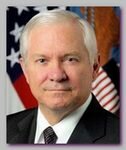– PAKISTAN’S COLD SHOULDER
 Amide the surprise visit to Pakistan of USA Defense Secretary Robert Gates, on Thursday 01/21/2010, Pakistan turned a cold shoulder to USA regarding the war in Afghanistan. Robert Gates’s visit was aimed to encourage Pakistan to be much more determined in its swimmingly Phony-War on terror and to coordinate the military efforts against the Taliban and alike on both sides of the Afghani-Pakistani border.
Amide the surprise visit to Pakistan of USA Defense Secretary Robert Gates, on Thursday 01/21/2010, Pakistan turned a cold shoulder to USA regarding the war in Afghanistan. Robert Gates’s visit was aimed to encourage Pakistan to be much more determined in its swimmingly Phony-War on terror and to coordinate the military efforts against the Taliban and alike on both sides of the Afghani-Pakistani border.
Despite billions of military aid to Pakistan, specifically designated to fight terror, Pakistan’s army has said it will launch no new offensives in 2010 against the local branch of the Taliban – Tehrik-e-Taleban – TTP. Army spokesman Athar Abbas told the BBC the “overstretched” military had no plans for any fresh anti-militant operations over the next 12 months. The PAKISTANI ARMY, one of the ten largest armies in the world, channeled only little of its resources in the last year to fight Islamic militancy in two major operations – the Waziristan-Offensive in 10/2009, and the offensive which followed the Swat-Crisis, in 05/2009. Whatever the reason is the Pakistani army is far from being “overstretched”.
It is assumed that the internal political crisis, the growing resentment toward USA (see – Gloomy-Report) and the lake of tangible success fighting the TTP are behind the snub to Washington (see – Wide-Implications).
In the recent month three TV interviews and video footages were recorded and aired from Pakistan and referred solely to the war in Afghanistan. On 01/09/2010, the Pakistani TV channel AAJ showed a video footage with Hakimullah Mehsud and the CIA-Bomber – Humam al-Balawi (see – Balawi’s Footage). On 01/17/2010 the French TV broadcasted an interview, in Pakistan, with a Belgian convert Abu-Adam Saifoula and two days later the Arabic TV network Al-Jazeera aired an interview with Sirajuddin Haqqani. It is hard to believe that while journalists are able to contact, more then once, senior Islamic militants – the Pakistani ISI is unable to track them down. All together it indicates that the pressure of the Pakistani Army on Taliban and Al Qaeda elements in Pakistan was significantly eased.
On the other hands since the 01/01/2010 volleyball attack there were no major suicide bombings in Pakistan, which suggests the possibility that behind the scenes a sort of an understanding was reached between the Pakistani Army and Tehrik-e-Taleban (see – Deal With Militancy).
Robert Gates’s one-day trip comes at a crucial time in the fight against Al Qaeda and the Taliban, with the USA planning to commit 30,000 more troops to Afghanistan. He was expected to tell Pakistan that it could do more against top Taliban leaders operating in its territory, some of whom are alleged to have close links to Pakistan’s ISI intelligence service. Before arriving in Islamabad, Secretary Robert Gates told reporters travelling with him from India: “You can’t ignore one part of this cancer and pretend that it won’t have some impact closer to home”. Talks were also expected to focus on US UAV drone strikes against militants near the Afghan border.
************************
Read more –
–